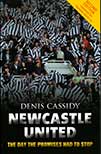 The day the promises had to stop
The day the promises had to stop
by Denis Cassidy
Amberly Publishing, £9.99
Reviewed by Mark Brophy
From WSC 312 February 2013
As calls for improved governance of football clubs continue to be made, Denis Cassidy’s experiences after being appointed a non-executive director of Newcastle United in 1997 give an illustration of just what can go wrong. He remained in position for 20 months, during a period which spanned the removal of Kenny Dalglish and appointment of Ruud Gullit as well as the News of the World undercover sting which forced the owners Freddy Shepherd and Douglas Hall to leave the board for a short time.
Despite the inside track he can provide, the book itself is a mixed bag. Though it’s styled as an attempt to show how the creation of the Premier League has affected the game in England, much of the book sets the scene for the section describing events during the short period Cassidy was on the board, and concludes with a run down of his thoughts on how to ensure success. Alex Ferguson’s views on success might prick up a few more ears, of course.
That’s not to say that there isn’t interest in the rest of the book. Cassidy’s insider knowledge isn’t limited to the period of his tenure on the board and his excellent contacts mean the reader is often left wanting to hear more. At one point, he reports meeting Lord Taylor just after the delivery of the report which changed English football post-Hillsborough, frustratingly without any record of the conversation.
It’s that 20-month period in the boardroom where the book comes to life, however. Though current owner Mike Ashley doesn’t escape criticism, Cassidy clearly disapproves of the way the Shepherds and Halls ran Newcastle; he calls them “vandals” at the point they are trying to force their way back into control of the plc board. He suggests John Hall used the club first as a promotional vehicle for his own regional interests then later as a cash cow for his other businesses. Cassidy points out that Newcastle abandoned corporate governance best practice when they removed independent directors from the board in favour of the majority shareholders’ nominees. The Shepherds and Halls are painted as draining the club to the point of financial chaos, to their own personal benefit.
The final implied criticism, left to an appendix on the last page, is both the largest and via its format least open to argument. Without commentary, it’s an account detailing how much was taken from the club by the Hall and Shepherd families in their time at the club between 1996 and 2007. The total comes to nearly £144 million. As Cassidy succinctly puts it earlier: “Did their performance over that period justify such rewards?”